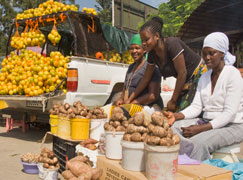Wet markets key to Africa's food security
28 January 2015
A compilation of 25 studies in Africa has found that informal markets provide essential
sources of food and income for millions of poor people, with milk and meat that is
often safer than supermarkets.
Misguided efforts to control the alarming burden of food-related illnesses in low-
income countries risk intensifying malnutrition and poverty – while doing little to
improve food safety. Blunt crack-downs on informal milk and meat sellers that are a
critical source of food and income for millions of people are not the solution.
This is a key finding of a book released on 27 January by the International Livestock
Research Institute (ILRI) and its partners, called
Food Safety and Informal
Markets: Animal Products in Sub-Saharan Africa. The study investigates
traditional or informal markets in food products. These are often called wet markets
because they use so much water in cleaning as a result of the perishable
and often
contaminated nature of the foods they sell.
These venues sell most of the livestock and fish products consumed in Africa. And
they are growing rapidly as rising populations and incomes drive greater demand for
meat and milk.
While the food sold in informal markets is often safe, they are suspected of spreading
dangerous pathogens ranging from salmonella and E.coli to severe acute respiratory
syndrome, avian influenza and tuberculosis. But ILRI researchers warn that the push
for greater food safety standards in these markets must be informed by an
understanding of their vital role as a provider of food and income to several hundred
million people who rank among the world's poorest.
"Our work across eight countries found that we are right to be concerned about food
safety in informal markets – from milk in Mali, to fish in Ghana, to chicken in
Mozambique, to beef in Kenya – particularly for spreading gastrointestinal diseases
that are a
leading cause of sickness and death in developing countries," said Delia
Grace, the programme leader for food safety and zoonoses at ILRI.
"But it also shows that we are wrong to think that we can just adopt solutions
developed in wealthy countries that favour large commercial operations over small
producers. That will just exacerbate hunger and further limit money-earning options
for the poor."
In most developing countries, more than 80% of livestock product purchases occur
at informal markets and in places where there is no formal alternative such as a
western-style supermarket close at hand. And the studies find that this is unlikely to
change for decades to come.
Importantly, the studies in east and southern Africa have found that where
supermarkets are an option, because of a poorly patrolled chain of custody between
producer and seller, milk and meat sold in supermarkets may pose a greater health
threat than what is sold in traditional
markets.
Moreover, small producers have many attractions for poor consumers: they are
typically within walking distance for people who lack cars and they offer the
opportunity to purchase fresh food in small amounts; they also often will extend
credit and typically offer the traditional foods their customers prefer.
"We need to understand how much disease is caused by unsafe milk and meat in low-
income countries and also how much they contribute in terms of nutrition and
income," said Kristina Roesel, the co-coordinator of the Safe Food, Fair Food Project
at ILRI. "We need to understand the complete picture so we can work to improve
food safety without harming food and economic security."
The main lesson from research on food safety issues in Africa, the authors say, is
that in the developing world, "policymakers need to look to the facts, not just the
fears, before moving to curtail meat sales at the local wet market or purchases of
unpasteurised
milk from traditional street vendors".
Hazards are not always risks
A key finding is that it is important to separate potential hazards – bacteria, viruses,
parasites, chemicals and toxins – from the real-world risks they are likely to present
to consumers. Data from sites across East Africa, for example, have found that the
raw, unpasteurised milk commonly available from street vendors and traditional
markets may contain many health hazards. Yet the actual risks to consumers may be
negligible given the common practice in this region of boiling milk before consuming it.
"Food safety policy should be guided by rigorous research to understand the ways
food is produced and consumed in different societies so we can devise strategies
that are most likely to reduce the risks, particularly to poor consumers," said Roesel.
For example, training informal milk vendors in Kenya and offering them incentives to
improve milk handling practices
that can transmit diseases such as brucellosis,
tuberculosis and diarrhoea generated lasting benefits worth US$28-million a year.
Source: International Livestock
Research Institute
 Hawkers at an informal market on the roadside in Hoedspruit, Limpopo province. (Image: MediaClubSouthAfrica.com: Chris Kirchhoff)
Hawkers at an informal market on the roadside in Hoedspruit, Limpopo province. (Image: MediaClubSouthAfrica.com: Chris Kirchhoff)




